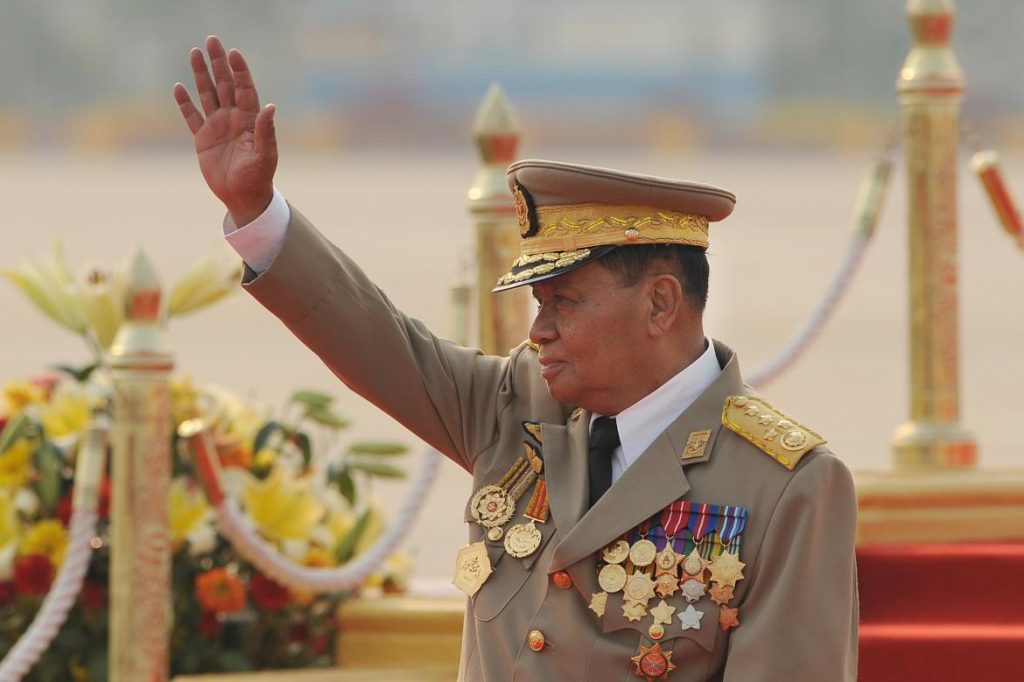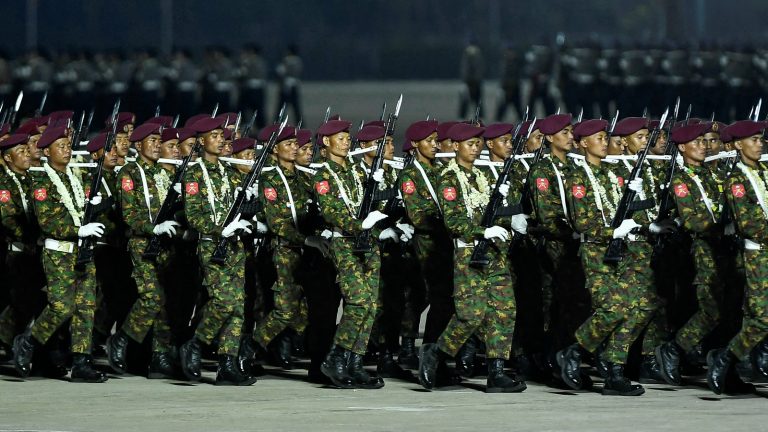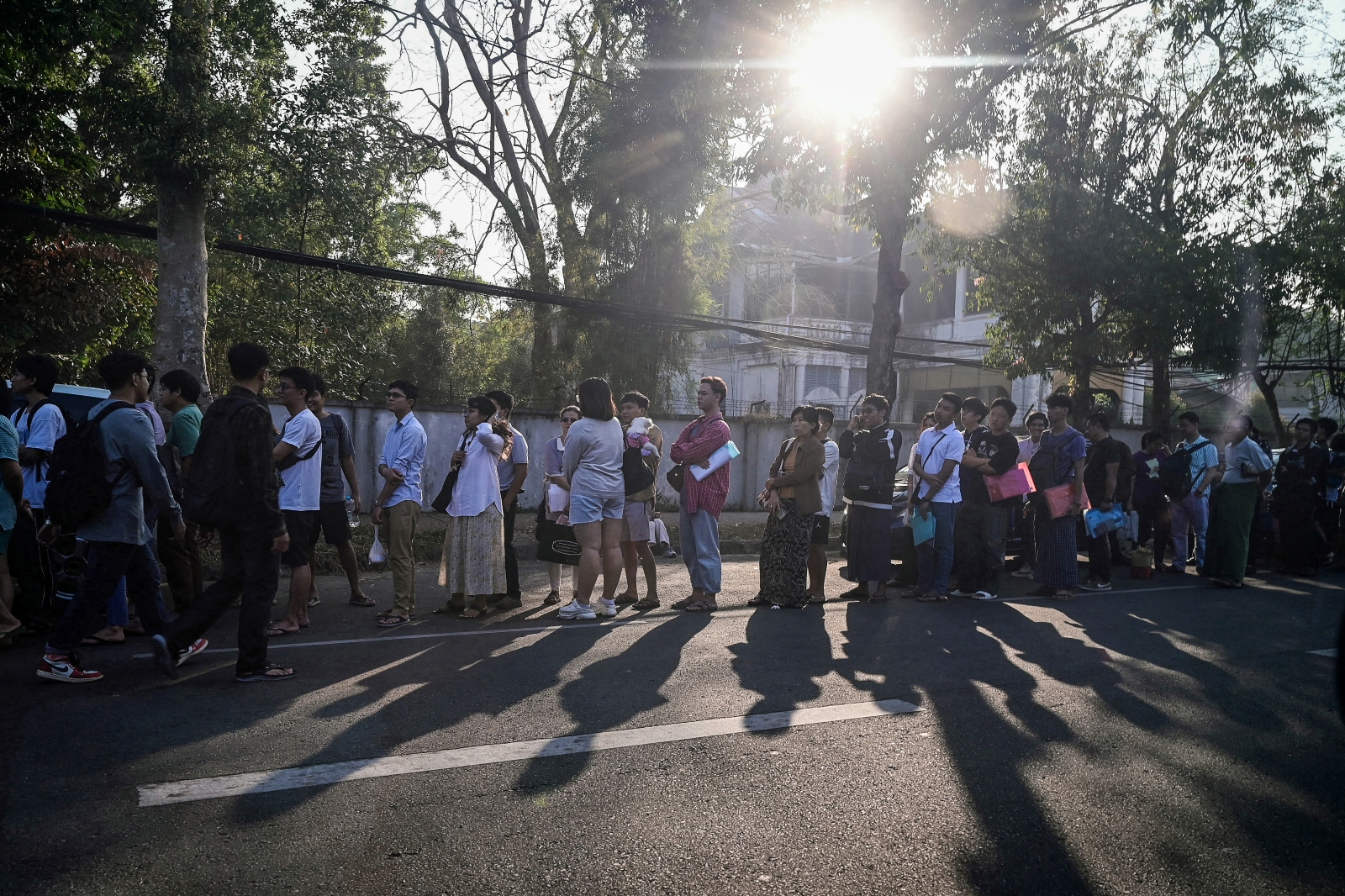A recent photo of former Senior General Than Shwe receiving a high-level Chinese visitor led some to speculate that the former dictator still has the ability to influence politics.
By SITHU AUNG MYINT | FRONTIER
THE MINISTER of the International Department of the Communist Party of China’s central committee, Mr Song Tao, had a busy round of meetings during a five-day goodwill visit to Myanmar that began on August 10.
Among those whom Song held talks with were State Counsellor and Foreign Minister Daw Aung San Suu Kyi, Tatmadaw Commander-in-Chief Senior General Min Aung Hlaing, leading members of the previous government and the former dictator, U Than Shwe.
A photo of Song meeting former Senior General Than Shwe at his opulent Nay Pyi Taw residence on August 11 was published by the CPC’s International Department and attracted intense interest in Myanmar.
There was intrigue, and much surprise, last December when news emerged that Than Shwe had received Aung San Suu Kyi for a meeting at his residence less than a month after the National League for Democracy’s landslide election victory.
Support more independent journalism like this. Sign up to be a Frontier member.
The meeting with the senior Chinese official sparked renewed speculation among the public and news organisations about whether Than Shwe has retained any influence over politics in Myanmar and if so, how much. It has also raised interest in what kind of person he is and how he managed to rule the country for 20 years.
These are questions I would like to discuss this week.
Than Shwe was the third military dictator since 1962, when General Ne Win deposed the elected government of Prime Minister U Nu. Ne Win ruled until September 1988, when he was ousted in a coup lead by Senior General Saw Maung, who then brutally crushed the national uprising against the government. Than Shwe succeeded Saw Maung in 1992.
The dictator Ne Win ruled Myanmar for 26 years in various capacities, as commander-in-chief, president and as chairman of the Burma Socialist Programme Party. Than Shwe, a true-blue military dictator, never shed his uniform during the 20 years he ruled the country.
Ruinous economic policies under Ne Win resulted in Burma being declared a “Least Developed Country” by the United Nations in 1987. It retained that ignoble status under Than Shwe. What was worse, the façade of a market economy adopted by Than Swe’s regime resulted in the depletion of the nation’s natural resources, including timber, natural gas, jade and copper.
Human rights violations and the persecution of the NLD after the dishonoured election in 1990 resulted in Myanmar becoming the target of sanctions imposed by the United States and the European Union.
Shunned by much of the international community, Myanmar began to rely heavily on support from China, which invested in the country and exploited its natural resources, and Russia, from which it bought military equipment. The parlous state of the economy and a bloated defence budget saw a sharp decline in the quality of education, healthcare and the standard of living.
The worst decisions that Than Shwe made involved changes to the Tatmadaw and were informed by the disintegration of Yugoslavia after the death of its dictator, Josip Broz Tito, in 1980.
Than Shwe changed the composition of the Tatmadaw from an army that included members of all ethnic nationalities to one dominated by the Bamar. His reasoning was that if members of ethnic minorities held high ranks in the Tatmadaw they might be disloyal and lead a rebellion to leave the Union. This was revealed by former generals who were involved in the in the peace process launched by former President U Thein Sein.
Other changes by Than Shwe resulted in the Tatmadaw training more officers than it needed and assigning them to senior positions in the civil administration. In the early 1990s, the Tatmadaw’s Defence Services Academy at Pyin Oo Lwin was producing about 150 officers a year. A decade later it was producing about 3,000 officers a year, a 20-fold increase.
The changes engineered by Than Shwe also resulted in more young DSA graduates being interested in civil administration than in becoming professional military officers. This change has contributed to the deterioration in the performance of the civil administration.
Than Shwe retreated from public view in 2011 after handing over power to a government headed by former generals of his choice. They won seats the previous year in an election held according to the provisions of the 2008 Constitution that was planned by Than Shwe to ensure the military retained a strong grip on power.
There have been many indications since 2011 that Than Shwe’s power and influence were fading.
After the Thein Sein government took office there was a gradual withdrawal of the preferential treatment that businesses owned by or linked to Than Shwe’s family had enjoyed under junta rule.
One was the Htoo Group of Companies owned by the crony tycoon, U Tay Za, in whose conglomerate Than Shwe’s family was said to have invested heavily. Air Bagan has stopped flying and other businesses in the Htoo group are not doing well. Businesses run by Than Shwe’s children keep a low profile.
Dictator Than Shwe’s grand strategy – for the 2008 Constitution to ensure that generals and former generals run the country for another 30 or 40 years – has failed. Less than five years after junta rule ended in 2011, factional disputes erupted among prominent former generals.
Last year the military-linked Union Solidarity and Development Party was crushed in an election by the National League for Democracy headed by Aung San Suu Kyi, who the military had regarded as their arch enemy for decades.
Although Min Aung Hlaing was hand-picked by Than Shwe for the Tatmadaw’s top job he has shown a much different approach to political affairs and military reform than his predecessors.
Despite what some may think, it is clear that Than Shwe no longer has the ability to influence politics or the Tatmadaw.







